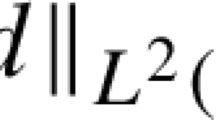Abstract.
We introduce two definitions of an averaged system for a time-varying ordinary differential equation with exogenous disturbances (“strong average” and “weak average”). The class of systems for which the strong average exists is shown to be strictly smaller than the class of systems for which the weak average exists. It is shown that input-to-state stability (ISS) of the strong average of a system implies uniform semi-global practical ISS of the actual system. This result generalizes the result of [TPA] which states that global asymptotic stability of the averaged system implies uniform semi-global practical stability of the actual system. On the other hand, we illustrate by an example that ISS of the weak average of a system does not necessarily imply uniform semi-global practical ISS of the actual system. However, ISS of the weak average of a system does imply a weaker semi-global practical “ISS-like” property for the actual system when the disturbances w are absolutely continuous and \(w, {\dot w}\in;{\scr L}_\infty\). ISS of the weak average of a system is shown to be useful in a stability analysis of time-varying cascaded systems.
Similar content being viewed by others
Author information
Authors and Affiliations
Additional information
Date received: April 6, 1999. Date revised: April 11, 2000.
Rights and permissions
About this article
Cite this article
Nešić, D., Teel, A. Input-to-State Stability for Nonlinear Time-Varying Systems via Averaging. Math. Control Signals Systems 14, 257–280 (2001). https://doi.org/10.1007/PL00009885
Issue Date:
DOI: https://doi.org/10.1007/PL00009885



